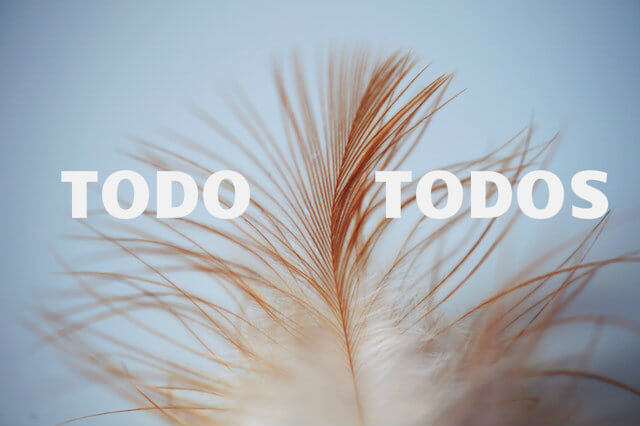"Todos" and "todo"

I'm sure you've seen todos many times, sometimes with an article after it (Todos los días), sometimes without it (Todos vamos), sometimes in feminine form (todas) or without the -s at the end (todo).
So, what's each version for?
Every
If we say "every", we're using:
Todos los + noun
Todas las + noun
Ex: Todas las mañanas - Every morning
We talk about more than one morning (all of them!) so todas is plural. Morning is feminine (mañana) and that's why todas is too.
Ex: Todos los niños - Every children
Niños is masculine plural, so todos is too.
The whole
We use:
Todo el + noun
Toda la + noun
You can see it's just like the previous case but in singular, because in this case we talk about one only thing.
Ex: Todo el día - the whole day
Toda la comida - The whole food / all the food* (see note below).
Día and comida are singular words. So todo/a is too.
NOTE: Both these two cases can be translated as "all". Try to translate it into "every" and check if the noun is plural. If you check those two boxes, then it's todos los/ todas las.
This is something to bear in mind specially if the word you use is plural in English and singular in Spanish (like ropa - clothes) or the other way around:
Toda la ropa (all the clothes) not todas las ropa
Everything and everybody
This is when we don't use articles:
Todo - everything
Todos - Everybody / all people/ all of us,you,them
Also, the expression todo el mundo, means everybody as well.
Practice
Fill in the gaps with todos, todas, todo or toda
I will translate it always with "all" so I don't give you extra clues.
______ en la oficina vamos a ir a la fiesta
Everybody in the office is going to go to the party.Intento hacer pilates _____ las tardes
I try to do pilates all the evenings/every evening.¿Vas a comer ___ el pan?
Are you going to eat all the bread?He tirado ______ la ropa vieja esta mañana
I have thrown away all the old clothes this morning.¿Tiene ___ ya preparado?
Does she have all/everything prepared already?He escuchado ______ las canciones del disco
I have listened to all the songs/every song of the album.¿Estamos ____ aquí?
Are we all here?_____ parece más fácil si te relajas
All seems easier if you relax.______ los empleados aquí tienen un descanso largo
All the employees here have a long break.
Sol: todos/todas/todo/toda/todo/todas/todos/todo/todos
¡Os deseo un buen día a todos! / I wish you all a good day!
¡Hasta pronto!